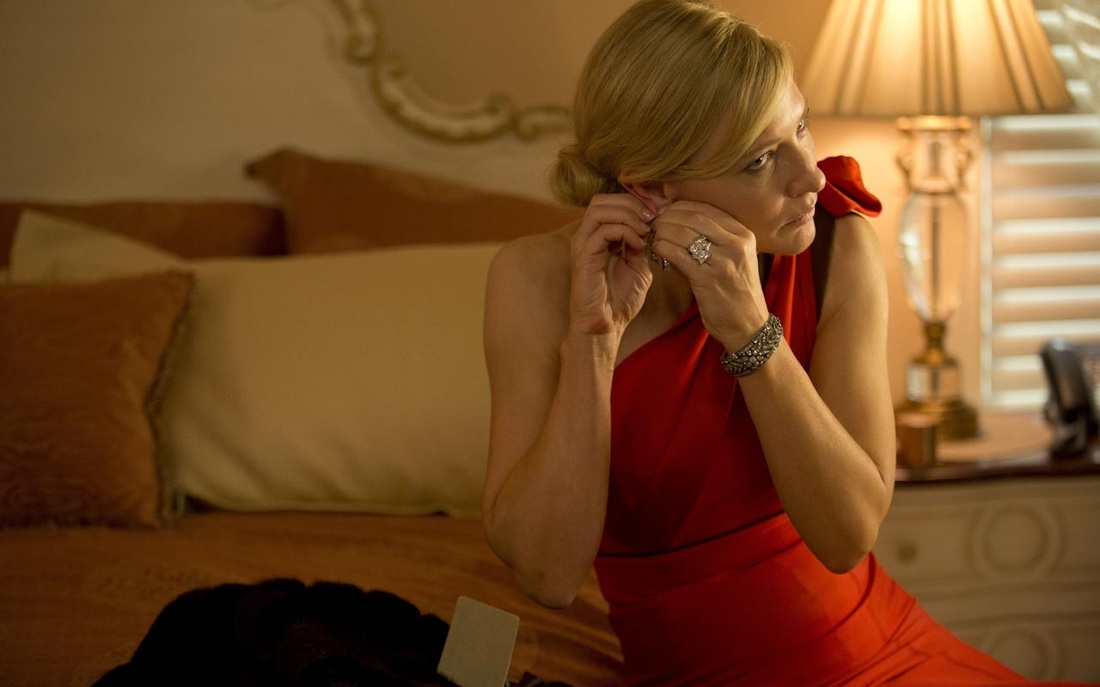Film review: Blue Jasmine (2013)
You can’t blame Woody Allen for repeating himself from time to time. What’s remarkable in his filmography of nearly fifty features isn’t the repetition, but the variation within the familiar themes he has retreaded. Just when you might have started to suspect he had grown content with churning out one forgettably charming city symphony with the name of a European capital in its title per year, Allen has lurched back into grimmer, tragicomic terrain.
In Blue Jasmine, Cate Blanchett plays a Park Avenue socialite toppled from her 1% paradise when her Wall Street husband, Hal (Alec Baldwin) turns out to be a Bernie Madoff-esque crook. When we meet her, she’s already been stripped of her jewels and minks and, we soon realize, suffered a complete psychotic break. On the cross-country flight from New York to San Francisco, where she plans to move in with her virtually estranged working-class sister, Ginger (Sally Hawkins), Jasmine blathers on and on about her woes in an assured, vaguely Southern but ultimately placeless accent exclusive to the rich. Jasmine, who changed her name from Jeanette, which had “no panache,” pronounces “Luis Vuitton” with an overzealous French accent and is prone to outbursts like “WHO DO I HAVE TO SLEEP WITH AROUND HERE TO GET A STOLI MARTINI WITH A TWIST OF LEMON?!”. Her mind already half-gone along with her fortune, her marriage and her social status, she lives on Xanax and vodka and skitters through a series of hardships like a carsick Chihuahua.
Blue Jasmine, even with its jazzy soundtrack and romantic views of New York and San Francisco sidewalks, is not a quirky character study of a neurotic so much as a classical drama. In fact, it could play out against a blank scrim or a cardboard backdrop painted to look like the Golden Gate Bridge and probably be about as effective. From its opening shot—a glaringly computer-generated view of an airplane taking Jasmine from New York to San Francisco--Blue Jasmine seems obstinately theatrical. Having spent years living like a French monarch with her husband (literally) dangling diamonds in front of her face to keep her distracted from his financial frauds and infidelity, Jasmine faces a reckoning that seems to belong more to a Greek tragedy than to a social satire.
Blue Jasmine is the newest and sharpest iteration of Allen’s long-time obsession with the well-worn patterns of tragedy, flaunted humorously by the full-on masked Greek chorus of Mighty Aphrodite (1995) and approached more gravely in films like Another Woman (1988) and Deconstructing Harry (1997). Jasmine’s tragic flaw isn’t her greed, as the Birkin bag she’s managed to keep away from the Feds might suggest, but plain old pride. And yet, addle-brained and delusional as she may be, she’s still capable of a few rare moments of grace. When Ginger’s ex-husband, Augie (Andrew Dice Clay), runs into Jasmine on the street and ruins her chance to start over with a wealthy new fiancé (Peter Sarsgaard) by revealing the past she is trying to keep hidden, there’s no trace of anger or worry in her expression. She’s too floored by the news that her estranged stepson, Danny (Alden Ehrenreich), is alive and well. The look that passes across her face—so quickly that you might miss it, and so foreign to her character that you might mistake it for something else—is one of genuine concern for another human being.
Perhaps the most tragic part is that the life led by her sister, Ginger, which Jasmine could easily share if she would just get over herself, isn’t all that bad. Ginger might be mousy and common, but she at least has a boyfriend who cares for her and her children, a cramped but hardly slum-like apartment, and a menial but steady job at a grocery store. The happiest two people we see in the film are Ginger and Augie (in a flashback) on a visit to New York, gawking at the city sights in a limo Jasmine hired and kissing like newlyweds. But Jasmine, like a lot of Woody Allen protagonists, can’t see past a received idea of what her life should be. She’s too concerned with being substantial to value anything so trite as happiness.
As pathetically fascinating as Jasmine’s meteoric descent from riches to rags may be, Blue Jasmine never becomes a simple indulgence in schadenfreude. This has less to do with Allen's script than Blanchett’s performance. The term “tour de force” is getting thrown around a lot, but it doesn’t seem adequate to describe the roiling, crackling energy Blanchett radiates in her tiniest gestures and most grandiose explosions. She endears us to Jasmine even as we grimace at her excess, narcissism, and self-delusion. We may pity or hate her, but through some miraculous alchemy, Blanchett keeps us on her side. We want her harebrained, manipulative schemes to work; we want to know she’ll be OK in the end. As many have already pointed out, Blue Jasmine’s storyline and central character read like an updated Streetcar Named Desire. Maybe Jasmine is a contemporary Blanche DuBois—only in Allen’s retelling, she can’t depend on the kindness of strangers.
Woody Allen has returned—for now—from his grand tour of Barcelona, Paris, London and Rome, and I for one am happy to see that his homeland has inspired within him a level of bitterness about the world we haven’t seen in years. Blue Jasmine may draw inspiration from Ruth Madoff and countless other Park Avenue matrons who plummeted from grace in the fallout from the recent financial crisis, but its story is nothing short of ancient. Oedipus goes blind; Cassandra goes mad; Jasmine, at long last, forgets the words to “Blue Moon,” the song that was playing when she and Hal first met. It’s a heartrending final joke in Allen’s funny little tragedy.
-----------------------------
Double Exposure, 2013
